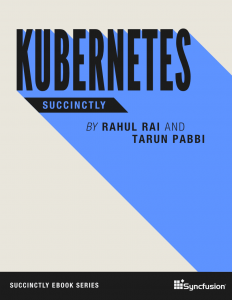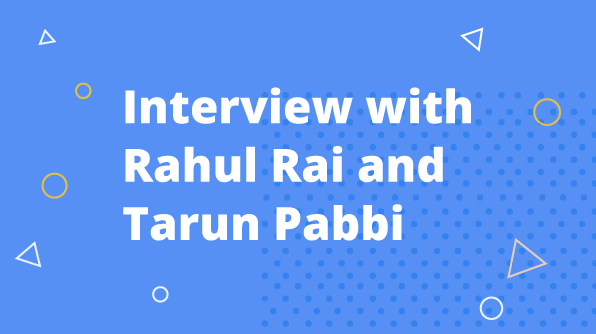The following is a short interview with Succinctly series authors Rahul Rai and Tarun Pabbi, whose new ebook, Kubernetes Succinctly, was published recently. You can download this ebook from our ebook portal.

What should people know about Kubernetes? Why is it important?
With containers, developers can migrate applications transparently among different infrastructures such as developer machines, local clouds, and public clouds. Kubernetes is a solution stack for containerized applications that allows you to use code to provide a platform for containerized applications and containerized services such as SQL Server and RabbitMQ. The application platform code, which is in the form of specifications written in YAML or JSON format, can be shared across clouds to provision a consistent environment for applications.
We, the developers, will sooner or later need to adopt containers and their most popular orchestrator—Kubernetes—in our day-to-day jobs. Containers and Kubernetes are no longer industry buzzwords. They are widely adopted by the industry and host mission-critical workloads of enterprises. By understanding the internals of Kubernetes, you will be able to make the best use of the platform and provide optimal outcomes to your clients. Not to mention, you will have a lot of fun doing so.
When did you first become interested in Kubernetes?
Rahul: As a consultant, I work with large enterprises and a common issue troubling them is managing the lifecycle of the services that run their mission-critical workloads. Some of my largest clients have unified their IT by moving to Kubernetes. Kubernetes is not only friendly to IT for its class ALM (Application Lifecycle Management) capabilities, but is also loved by developers since it allows them to focus on solving business problems.
I started tinkering with orchestrators such as Azure Service Fabric and Kubernetes in 2017 for addressing the pains of my clients and also out of interest.
Tarun: Toward the end of 2017, we were redesigning our application to microservices architecture and looking for good platform options. The power of Kubernetes amazed us at that time, and I have been hooked on it ever since.
By writing this ebook, did you learn anything new yourself?
Rahul: Kubernetes is a minefield of hidden gems. We had a lot of fun documenting our learnings in the book. I learned several commands and the internals of Kubernetes and Helm. By reading this book, you are going to learn from our collective experience of exploring this platform.
Tarun: Absolutely. The extensive research and samples that we built to write this book were helpful and enabled me to implement the same for my customers.
How will this subject change over the next few years?
Kubernetes is still evolving, and although it is production-ready, there are still areas in which active development is currently happening, such as support for Windows containers and a native comprehensive metrics server.
We also expect OpenFaaS (Functions as a Service) to get a lot more traction and Kubernetes to become the defacto orchestrator across clouds.
Do you see Kubernetes as part of a larger trend in software development?
Kubernetes is loved by enterprise operations and developers alike due to its ease of use and clear separation of responsibilities. Several enterprises have embarked on digital transformation journeys with Kubernetes as the cornerstone. Platform as Code, which is the model used by Kubernetes, is a natural evolution of Platform as a Service, and therefore, we expect Kubernetes to manage a significant share of enterprise workloads.
What other books or resources on Kubernetes do you recommend?
The source of truth for anything Kubernetes is the official Kubernetes documentation, which is available at https://kubernetes.io and is always up-to-date. Kelsey Hightower is an authority on Kubernetes and his tutorial, Kubernetes the hard way, is highly regarded in the Kubernetes community. Kubernetes: Up and Running is authored by the creators of Kubernetes and, although slightly outdated, is a good read.
Who are your role models in the developer world?
Rahul: I admire programmers who work for the community and influence people every day. Two such people are Jon Skeet from Google, who is a well-known by developers searching for answers on Stack Overflow, and Scott Hanselman from Microsoft, who is excellent at presentations and full of humor.
Tarun: I also admire and follow Scott Hanselman from Microsoft for his exceptional command on a breadth of technology, and also Martin Fowler from ThoughtWorks for his in-depth explanations of programming principles.
How quickly can you learn a new programming language or tool?
If one uses the right resources, such as official documentation, getting-started guides, and short books such as those in Syncfusion’s Succinctly series, a developer will begin delivering solutions using a new programming language or a tool in a couple of days to around two weeks. We follow the same strategy and can get cracking in around the same duration.
How do you stay up-to-date on industry news?
Rahul: For all topics of interest, I have subscribed to email newsletters and Twitter handles. If I find something of interest, I try to explore it further by searching for articles and blogs.
Tarun: I find Twitter handles very useful for staying up-to-date for almost everything. Also, I have subscribed to multiple blogs and articles to stay in the loop of the industry.
Do you have a blog page or a website where people can find you?
Rahul: I experiment with cloud services and write about them on my blog: https://thecloudblog.net.
Tarun: I blog at https://www.tarunpabbi.com/.
If you liked this ebook, we think you’ll also enjoy:
- [Ebook] Docker Succinctly
- [Blog Post] Interview with Docker Succinctly Author Elton Stoneman
- [Blog Post] GitLab’s Gone Serverless: What Now?
- [Ebook] Go Web Development Succinctly
- [Ebook] Go Succinctly

Comments (1)
[…] Interview with Kubernetes Succinctly Authors Rahul Rai and Tarun Pabbi (Jacqueline Bieringer) […]